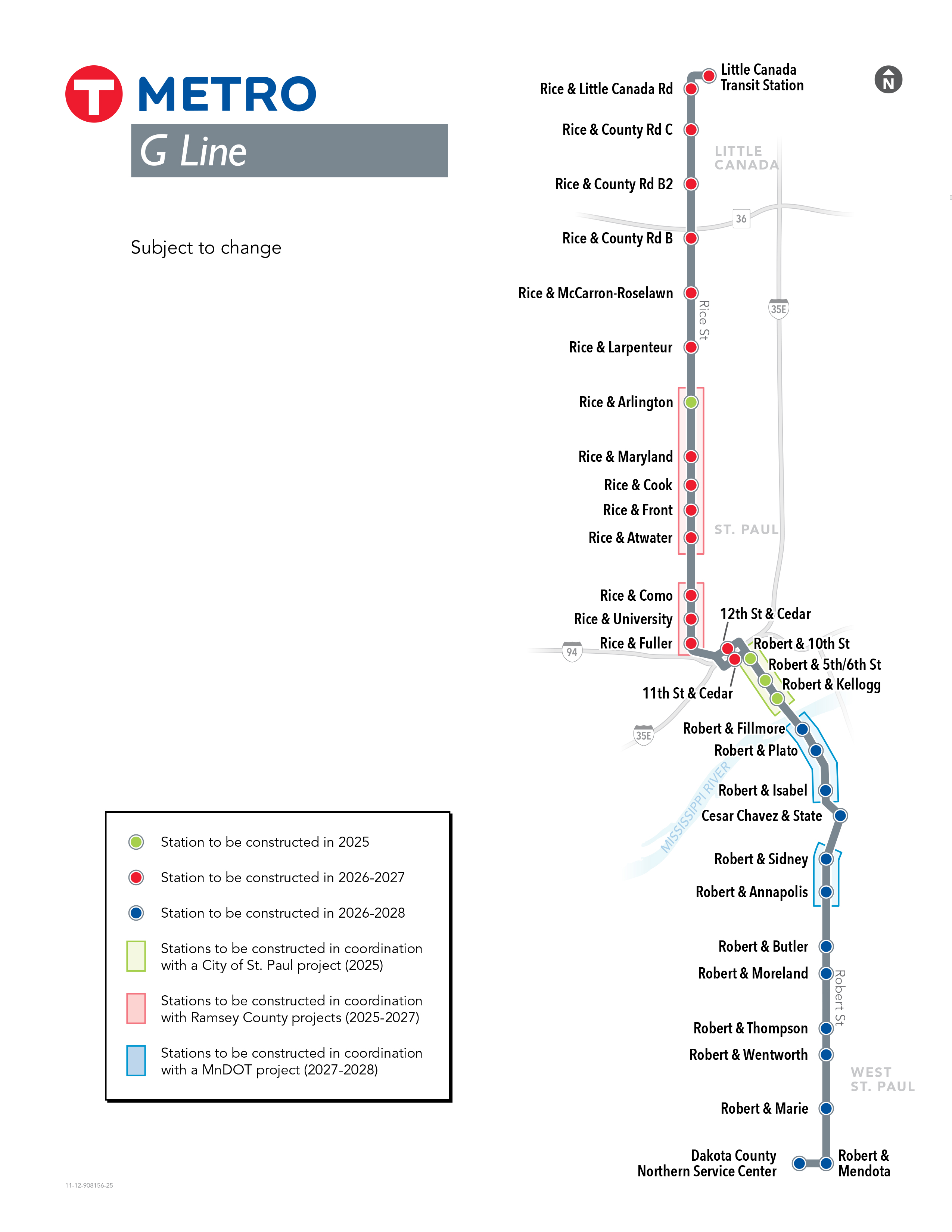Faster transit is coming to Rice Street & Robert Street
The G Line Design Phase comment period ended on Oct. 6. Final design of the G Line stations is now underway. Stay tuned for more information about the timing for major G Line construction as design is finalized in mid-2026. Preliminary station designs can be viewed here.
View project fact sheet in English, Spanish, Somali, Oromo, Hmong, Vietnamese, and Karen.

When is construction planned to begin?
Construction is planned to begin in 2026. For the remainder of 2025 and early 2026, staff will be completing detailed design and engineering work on G Line stations and related improvements. As the construction schedule is finalized, Metro Transit will share more information on the timing and duration of construction activities. The G Line is scheduled to begin service in 2027 (Phase 1) and 2028 (Phase 2).
Coordinated Project and G Line station designs
Some of the G Line station designs have been developed in coordination with infrastructure projects led by city and county partners. Notably, designs for three stations along Robert Street in downtown St. Paul and designs for five stations along Rice Street in St. Paul were completed through collaborative efforts with projects led by Ramsey County and the City of St. Paul. Since design work for these coordinated projects has already been finalized, changes to station designs in these areas are not anticipated. For additional details, please visit the Rice Street Reconstruction and Robert Street Reconstruction project pages.
What is the METRO G Line?
The METRO G Line is a planned arterial bus rapid transit (BRT) line. The G Line will provide fast and reliable transit service in the Rice Street and Robert Street corridor. The G Line will travel from Little Canada through downtown St. Paul to the Dakota County Northern Service Center.
Bus rapid transit is a fast and reliable transit service. BRT buses and stations are comfortable and easy to use. Learn more at metrotransit.org/brt or watch a short video.
Subscribe to the G Line Update and get project news delivered to your inbox.
G Line project phased delivery
Metro Transit plans to construct and open the G Line project in two phases, to best coordinate with other planned street construction in the corridor.
-
Phase 1 will include the northern portion of the corridor, from the newly established Little Canada Transit Station to Robert & Kellogg. Construction of these stations will occur between 2026 and 2027. Some stations will be constructed in coordination with major construction projects on Rice Street and Robert Street. The future G Line will use enhanced bus stops that will be constructed in coordination with Ramsey County and the City of St. Paul in 2025. Once construction is complete, G Line service will begin between Little Canada and downtown St. Paul.
-
Phase 2 will include the southern portion of the corridor from Robert & Fillmore to the Dakota County Northern Service Center. These stations are planned to be constructed by the end of 2028. Following construction, G Line service will be extended to travel the full length of the corridor from Little Canada to West St. Paul.
The G Line Final Corridor Plan identifies station locations for both phases of the G Line project.
The primary reason for phasing the G Line project is to better coordinate with planned construction on Robert Street. MnDOT, St. Paul Regional Water Services, and St. Paul Public Works are planning improvements to Robert Street. Metro Transit and agency partners plan to construct these projects at the same time to reduce disruption to communities and transit customers and to deliver a better multimodal corridor improvement. Metro Transit is working with MnDOT and other agency partners to coordinate all future construction on Robert Street, with a goal of completing all work on Robert Street within the G Line corridor by the end of 2028.
Expected project schedule (subject to change)
- 2022-2025: Planning
- 2025-2026: Engineering
- 2026-2028: Construction (Note: some construction coordinated with street reconstruction projects began in 2025)
Project Contact
Nasser Mussa
Community Outreach Coordinator
[email protected]